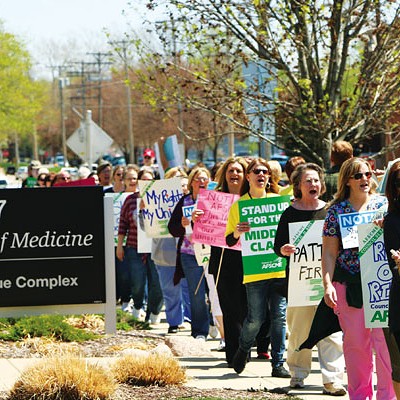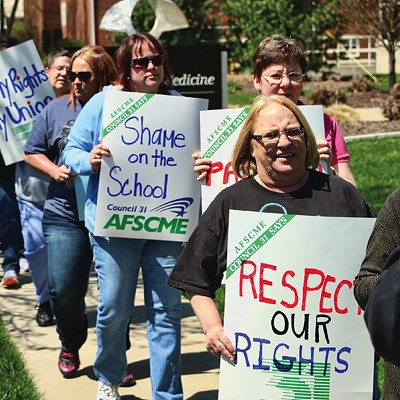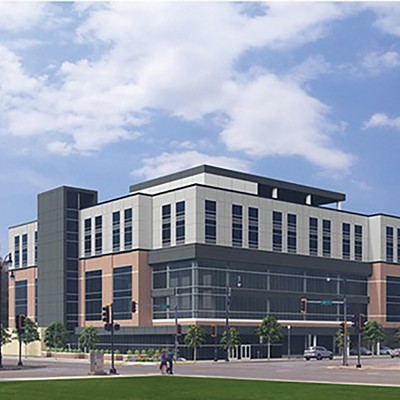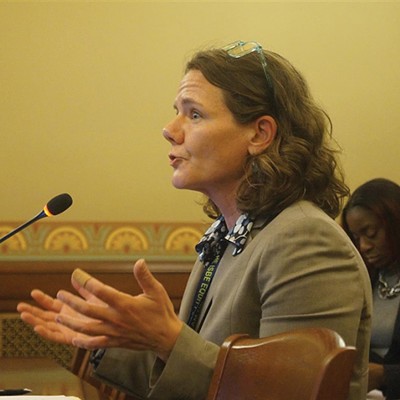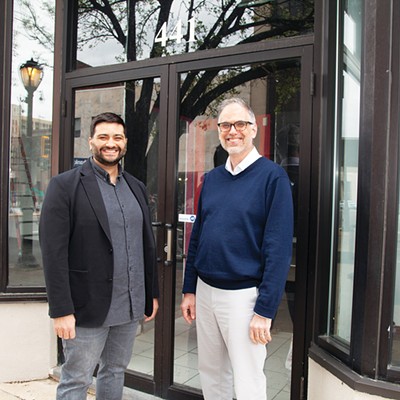Truth about health care reform
Bioethics expert speaks at SIU medical school
[
{
"name": "Air - MedRect Combo - Inline Content 1",
"component": "11490391",
"insertPoint": "3",
"requiredCountToDisplay": "1",
"parentWrapperClass": "fdn-ads-inline-content-block"
},{
"name": "Air - MedRect Combo - Inline Content 2",
"component": "11490392",
"insertPoint": "7",
"requiredCountToDisplay": "5",
"parentWrapperClass": "fdn-ads-inline-content-block"
},{
"name": "Air - MedRect Combo - Inline Content 3",
"component": "11490393",
"insertPoint": "12",
"requiredCountToDisplay": "9",
"parentWrapperClass": "fdn-ads-inline-content-block"
}
]
Health care reform is barely two weeks old, and many Americans have yet to separate fact from fiction, says Dr. Harry R. Moody, director of academic affairs for the American Association of Retired Persons. Moody, an author and expert on medical ethics, spoke April 2 to students, faculty and staff at Southern Illinois University School of Medicine in Springfield.
His presentation, “Bioethics Meets Politics: What Can We Learn from the Battle for Health Care Reform?” was part of the John and Marsha Ryan Bioethicist in Residence Program, which provides seminars, activities and mentorship opportunities for medical students in Springfield and Carbondale.
Organizations like AARP are struggling to convince people that recent health care reforms can have a positive outcome, Moody says. Recent studies in social science have shown that people with certain fixed views will hold to those opinions, no matter how much evidence they see to the contrary, he says.
“The more facts they get against their view, the more they become entrenched in it,” Moody says.
Moody’s goal is to dispel the myths surrounding health care, particularly for senior citizens. Though the U.S. faces an increase in its older population, the negative consequences are often over-hyped, he says.
“We’re not facing a problem because we have too many old people,” Moody says. “Somebody introduced me the other day, saying ‘these aging boomers, they’re terrible.’ People use metaphors like ‘silver tsunami,’ ‘iceberg’ and ‘train wreck.’ This is a complete fabrication.”
The cause of health care problems is not aging, Moody says, but the fact that the nation has not fixed systems like Social Security and Medicare.
Moody says he has faith in Social Security, because the U.S. Social Security Administration has pulled out of tough times before. In 1983, Social Security amendments raised taxes, cut benefits and spread the burden among many cohorts, keeping the system intact, he says.
“Believe me, I lose no sleep at night worrying about the future of Social Security,” Moody says. “The system is actually in pretty good shape.”
Another issue is the rumored $500 billion in spending cuts for Medicare. According to Moody, health care reform calls not for cuts, but for a reduction in the rate of growth for Medicare spending. Spending will continue to grow, at about six percent less than before. This is the equivalent of slightly reducing one’s household budget, while still spending money every month, Moody says.
In 1997, he says, Clinton and the Republican Congress reduced planned increases in Medicare spending by 12 percent, which is twice as much as the recommended six percent in this reform package.
Presentations like Moody’s can help future doctors prepare for patients’ questions about health care reform, says Ross Silverman, professor and chair of the Department of Medical Humanities at Southern Illinois University. Silverman says he brought Moody to speak because it’s important for his students to understand health care from a public policy standpoint.
“We want students to gain an understanding of how patients can receive and access care, and some of the barriers they encounter – not just structural barriers, but communication barriers and legal obstacles,” Silverman says. “Physicians interact with their patients on many different levels, and our responsibility is to help students, residents and clinicians to understand the dimensions that affect relationships with their patients.”
Moody says AARP will continue to help people understand health care reform, and he’s optimistic about the legislation’s outcome.
“This law isn’t perfect, but it’s a good step in the right direction,” Moody says.
Contact Diane Ivey at [email protected].
His presentation, “Bioethics Meets Politics: What Can We Learn from the Battle for Health Care Reform?” was part of the John and Marsha Ryan Bioethicist in Residence Program, which provides seminars, activities and mentorship opportunities for medical students in Springfield and Carbondale.
Organizations like AARP are struggling to convince people that recent health care reforms can have a positive outcome, Moody says. Recent studies in social science have shown that people with certain fixed views will hold to those opinions, no matter how much evidence they see to the contrary, he says.
“The more facts they get against their view, the more they become entrenched in it,” Moody says.
Moody’s goal is to dispel the myths surrounding health care, particularly for senior citizens. Though the U.S. faces an increase in its older population, the negative consequences are often over-hyped, he says.
“We’re not facing a problem because we have too many old people,” Moody says. “Somebody introduced me the other day, saying ‘these aging boomers, they’re terrible.’ People use metaphors like ‘silver tsunami,’ ‘iceberg’ and ‘train wreck.’ This is a complete fabrication.”
The cause of health care problems is not aging, Moody says, but the fact that the nation has not fixed systems like Social Security and Medicare.
Moody says he has faith in Social Security, because the U.S. Social Security Administration has pulled out of tough times before. In 1983, Social Security amendments raised taxes, cut benefits and spread the burden among many cohorts, keeping the system intact, he says.
“Believe me, I lose no sleep at night worrying about the future of Social Security,” Moody says. “The system is actually in pretty good shape.”
Another issue is the rumored $500 billion in spending cuts for Medicare. According to Moody, health care reform calls not for cuts, but for a reduction in the rate of growth for Medicare spending. Spending will continue to grow, at about six percent less than before. This is the equivalent of slightly reducing one’s household budget, while still spending money every month, Moody says.
In 1997, he says, Clinton and the Republican Congress reduced planned increases in Medicare spending by 12 percent, which is twice as much as the recommended six percent in this reform package.
Presentations like Moody’s can help future doctors prepare for patients’ questions about health care reform, says Ross Silverman, professor and chair of the Department of Medical Humanities at Southern Illinois University. Silverman says he brought Moody to speak because it’s important for his students to understand health care from a public policy standpoint.
“We want students to gain an understanding of how patients can receive and access care, and some of the barriers they encounter – not just structural barriers, but communication barriers and legal obstacles,” Silverman says. “Physicians interact with their patients on many different levels, and our responsibility is to help students, residents and clinicians to understand the dimensions that affect relationships with their patients.”
Moody says AARP will continue to help people understand health care reform, and he’s optimistic about the legislation’s outcome.
“This law isn’t perfect, but it’s a good step in the right direction,” Moody says.
Contact Diane Ivey at [email protected].
Illinois Times has provided readers with independent journalism for almost 50 years, from news and politics to arts and culture.
Your support will help cover the costs of editorial content published each week. Without local news organizations, we would be less informed about the issues that affect our community..
Got something to say?
Send a letter to the editor and we'll publish your feedback in print!


